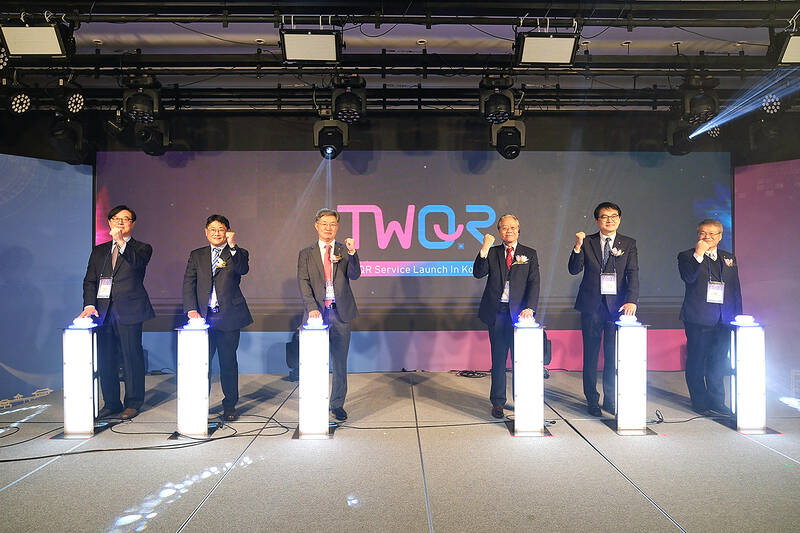The Taiwanese QR code mobile payment service, TWQR, has been launched in South Korea, the Bankers Association of the ROC (銀行公會) and Financial Information Service Co (FISC, 財金資訊) said in a joint statement yesterday.
The mobile payment service, available at 35,000 merchants in the East Asian country, is a collaboration between the two Taiwanese organizations and the South Korean financial services company BC Card Co, the statement said.
Thirteen Taiwanese financial institutions, led by the Bank of Taiwan (臺灣銀行), have partnered with BC Card for the new service, it said, adding that more banks and electronic payment service providers are expected to join the service.

Photo courtesy of Bankers Association of the ROC
Taiwanese with electronic wallets linked to any of the 13 financial institutions can pay for purchases or expenses in South Korea by scanning the merchants’ TWQR code without having to download separate apps, the statement said.
The new service would save users 1.5 percent on credit card processing fees, and reward them with 15 percent cash back until the end of April, it said.
Two-way travel between Taiwan and South Korea reached up to 2.5 million visits each year before the COVID-19 pandemic.
With mutual visits recovering quickly after the pandemic, South Korea was the third-most popular destination for Taiwanese travelers last year, the Bankers Association and FISC said, citing statistics provided by the Tourism Administration.
Yesterday’s announcement was made at a news conference in Seoul, with Bankers Association chairman Lei Chung-dar (雷仲達), FISC chairman Lin Kuo-liang (林國良) and BC Card CEO Choi Won-seok, as well as several business and industry representatives from the two countries attending.
“Taiwan and South Korea are geographically close to each other and are each other’s fifth-largest trading partner,” Lei said in the statement. “At a time when bilateral exchanges between Taiwan and South Korea are increasing, the launch of the TWQR mobile payment service in South Korea is expected to benefit more Taiwanese visiting South Korea and further promote cashless transactions.”
Following the introduction of TWQR in South Korea, the next step is to allow South Korean tourists to make simple and convenient payments in Taiwan, Lin said in the statement.
Longer term, FISC aims to work with more countries on cross-border payment cooperation and promote more financial exchanges, he added.

Anna Bhobho, a 31-year-old housewife from rural Zimbabwe, was once a silent observer in her home, excluded from financial and family decisionmaking in the deeply patriarchal society. Today, she is a driver of change in her village, thanks to an electric tricycle she owns. In many parts of rural sub-Saharan Africa, women have long been excluded from mainstream economic activities such as operating public transportation. However, three-wheelers powered by green energy are reversing that trend, offering financial opportunities and a newfound sense of importance. “My husband now looks up to me to take care of a large chunk of expenses,

SECTOR LEADER: TSMC can increase capacity by as much as 20 percent or more in the advanced node part of the foundry market by 2030, an analyst said Taiwan Semiconductor Manufacturing Co (TSMC, 台積電) is expected to lead its peers in the advanced 2-nanometer process technology, despite competition from Samsung Electronics Co and Intel Corp, TrendForce Corp analyst Joanne Chiao (喬安) said. TSMC’s sophisticated products and its large production scale are expected to allow the company to continue dominating the global 2-nanometer process market this year, Chiao said. The world’s largest contract chipmaker is scheduled to begin mass production of chips made on the 2-nanometer process in its Hsinchu fab in the second half of this year. It would also hold a ceremony on Monday next week to

TECH CLUSTER: The US company’s new office is in the Shalun Smart Green Energy Science City, a new AI industry base and cybersecurity hub in southern Taiwan US chip designer Advanced Micro Devices Inc (AMD) yesterday launched an office in Tainan’s Gueiren District (歸仁), marking a significant milestone in the development of southern Taiwan’s artificial intelligence (AI) industry, the Tainan City Government said in a statement. AMD Taiwan general manager Vincent Chern (陳民皓) presided over the opening ceremony for the company’s new office at the Shalun Smart Green Energy Science City (沙崙智慧綠能科學城), a new AI industry base and cybersecurity hub in southern Taiwan. Facilities in the new office include an information processing center, and a research and development (R&D) center, the Tainan Economic Development Bureau said. The Ministry

Nvidia is to open a quantum computing research lab in Boston, where it plans to collaborate with scientists from Harvard University and the Massachusetts Institute of Technology, Nvidia CEO Jensen Huang (黃仁勳) said on Thursday. Huang made the announcement at Nvidia’s annual software developer conference in San Jose, California, where the company held a day of events focused on quantum computing. Nvidia added the program after Huang in January said that useful quantum computers are 20 years away, comments that he sought to walk back on Thursday while joined onstage by executives from quantum computing firms. “This is the first event in history